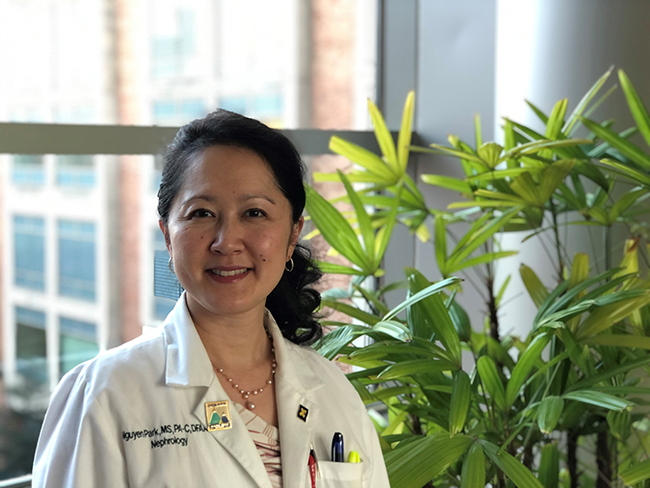PAs and Genetics: Asking All the Right Questions
Nguyen H. Park, DMSc, MS, PA-C, DFAAPA
President and Founder, Society of PAs in Genetics and Genomics
June 15, 2023

Do you love solving puzzles? Is science fiction on your nightstand or in your Libby app? Do you find the ethical, legal, and social issues of medical cases fascinating? Is your passion for medicine found in connecting with communities? Are you interested in new technology and staying on the cutting edge of research? Do you wish you were part of the kind of practice that allows you to really get to know your patients? Are you driven by those wins when you are able to make a difference for your patients? Were you the PA who took an undergraduate or high school course in genetics and loved it?
If you answered “no” to these questions, you may be telling yourself that genetics has no relevance to your practice of medicine. If so, then consider these questions:
- Have you treated anyone for chest pain, heart failure, hypertension, diabetes, hyperlipidemia, Staphylococcus aureas or recurrent infections, seizures, obesity, depression, or cancer?
- Have you ever prescribed allopurinol, citalopram, clopidogrel, codeine, fluoxetine, paroxetine, tramadol, or warfarin?
- Do you work in the emergency department, urgent care, dermatology, family practice, cardiology, psychiatry, nephrology, or surgical practice?
If so, then it is likely that you have seen and treated patients with genetic/genomic disorders, as genetics underlies all of medicine. Even when it comes to genetic disorders you read about during your pediatrics didactic course that you thought you might never see, those “rare” genetic/genomic diseases are actually not so rare after all. The latest artificial intelligence and deep learning research has calculated a substantial increase in the number of “rare” diseases from previous estimates of ~7,000.1 This means that collectively at least 1 in 10 people are affected by rare diseases. Almost 1,000 new rare disease diagnoses were discovered between 2000-2010, but at the same time, therapies for genetic disorders approved by the FDA also increased.2,3 This means we are able not only to diagnose our patients, but also to improve their quality of life – and even in some cases save lives.
If you answered “yes” to the above questions, then medical genetics may be a perfect fit for you. When I became a PA over 20 years ago, there were no PAs working in medical genetics. Now we have PAs working in this specialty across the country, carving paths and opening doors for other PAs in genetics as well as in subspecialty genetics clinics such as cardiovascular genetics. In every setting, these PAs are increasing access to care, decreasing wait times, and helping to shorten the diagnostic odyssey for patients and their families. For patients for whom therapies are not yet available, helping to put a name to their symptoms can resolve diagnostic uncertainty for families and prevent additional invasive or expensive diagnostic studies.
According to the latest genetics workforce study by the American College of Medical Genetics and Genomics (ACMG),4,5 the shortage of medical geneticists is expected to continue, affecting our rural and underserved populations most adversely. In practices in which PAs have been hired, the genetics clinics have not only decreased wait times substantially, but have also led to the opening of new satellite clinics which allow even more patients to undergo the genetic evaluations they so desperately need. PAs can provide prognostic information to help families plan for the future, aid them in understanding recurrence risks, and teach patients the value of medical research like that being conducted through the All of Us Research Program, in which any PA or PA student can participate. PAs can help patients navigate the ethical, legal, and social issues that affect both the patient and their family and guide them to the resources they need to achieve the health they deserve.
Why are PAs and genetics a perfect fit? Because we are trained in the medical model and can care for patients from birth to death, we can pivot like the stem cells of medicine that we are and bring our training and expertise to deliver compassionate care to our patients. Genetics is no different. Genetics, like medicine in general, is team-based, and PAs have been trained to be valuable members of the medical team. Medical genetics relies on excellent history-taking and physical examination skills. The questions about family and environmental history that PAs know to ask can be the difference between making or missing the diagnosis. The focus on caring for the whole patient and their family that is interwoven into PA education is integral to the practice of medical genetics. As the cost of genetic testing drops, and more and more patients become familiar with genetics and things like direct-to-consumer genetic testing, PAs on the frontlines of medicine will be expected to address questions regarding genetics and genomics. But are we ready?
Genetics is a field that can seem intimidating, but PAs should be aware that even many physicians feel as though their medical education in genetics has been inadequate, and often don’t feel prepared to care for patients who may have genetic or genomic influences on their health.6-8 PAs can be a part of the solution, but only if we have more genetics education and training. Because of this, I established the Society of PAs in Genetics and Genomics (SPAGG), a special interest group affiliated with AAPA that is dedicated to the education, advocacy, and placement of PAs in the field of genetics. I also work with the InterSociety Coordinating Committee for Provider Education in Genomics as the AAPA representative and with GenomeEd as one of the PA committee members, and assisted the true PA genetics forerunners, PAs Constance Goldgar and Michael “Rocky” Rackover, in rewriting the PA Genomic Competencies9 for our profession to serve as guideposts for PAs working in primary care. I am also the chair of the ACMG National Coordinating Committee’s PA Workforce Group and participated in a study deployed this year to study the PA genetics workforce. We have developed a free webinar series that can be found in AAPA’s Learning Central and other free educational resources found on the SPAGG website.
No matter the field of medicine in which you care for patients, your medical practice can benefit from thinking genetically. I encourage all of you to check out what’s new in genetics on the NIH’s genome.gov website, and ask yourself this question: Can I challenge myself to become an even better PA?
References
- Haendel M, Vasilevsky N, Unni D, et al. How many rare diseases are there?. Nat Rev Drug Discov. 2020;19(2):77-78. doi:10.1038/d41573-019-00180-y
- Brasil S, Pascoal C, Francisco R, Dos Reis Ferreira V, Videira PA, Valadão AG. Artificial Intelligence (AI) in Rare Diseases: Is the Future Brighter?. Genes (Basel). 2019;10(12):978. Published 2019 Nov 27. doi:10.3390/genes10120978
- Theodoris CV, Xiao L, Chopra A, et al. Transfer learning enables predictions in network biology [published online ahead of print, 2023 May 31]. Nature. 2023;10.1038/s41586-023-06139-9. doi:10.1038/s41586-023-06139-9
- Jenkins BD, Fischer CG, Polito CA, et al. The 2019 US medical genetics workforce: a focus on clinical genetics. Genet Med. 2021;23(8):1458-1464. doi:10.1038/s41436-021-01162-5
- Maiese DR, Keehn A, Lyon M, Flannery D, Watson M; Working Groups of the National Coordinating Center for Seven Regional Genetics Service Collaboratives. Current conditions in medical genetics practice. Genet Med. 2019;21(8):1874-1877. doi:10.1038/s41436-018-0417-6
- Campion M, Goldgar C, Hopkin RJ, Prows CA, Dasgupta S. Genomic education for the next generation of health-care providers. Genet Med. 2019;21(11):2422-2430. doi:10.1038/s41436-019-0548-4
- Haspel RL, Genzen JR, Wagner J, Fong K; Undergraduate Training in Genomics (UTRIG) Working Group, Wilcox RL. Call for improvement in medical school training in genetics: results of a national survey. Genet Med. 2021;23(6):1151-1157. doi:10.1038/s41436-021-01100-5
- Hyland K, Garber K, Dasgupta S. From helices to health: undergraduate medical education in genetics and genomics. Per Med. 2019;16(3):211-220. doi:10.2217/pme-2018-0081
- Goldgar C, Michaud E, Park N, Jenkins J. Physician Assistant Genomic Competencies. J Physician Assist Educ. 2016;27(3):110-116. doi:10.1097/JPA.0000000000000081
Additional Resources
- Society of PAs in Genetics and Genomics (SPAGG)
- NIH Inter-Society Coordinating Committee for Practitioner Education in Genomics (ISCC-PEG)
- NIH Genomics Education Resource Center (GenomeEd)
- PA Genomic Competencies – September 2016
- AAPA Learning Central – Genetics Series
- NIH National Human Genome Research Institute (genome.gov)
- NIH All of Us Research Hub

